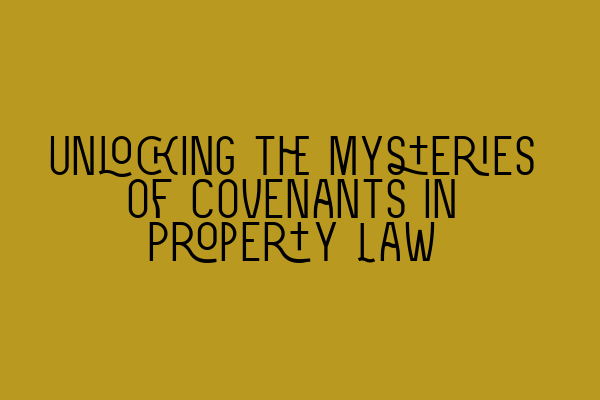Unlocking the Mysteries of Covenants in Property Law
Welcome to SQE Property Law & Land Law, where we specialize in helping clients navigate the complex world of property law. In today’s blog post, we’re going to dive into the fascinating and often mystifying topic of covenants in property law. Covenants are legal obligations or restrictions that bind the owners of a property and can have significant implications for its use and value.
Understanding covenants is essential for both property owners and potential buyers, as they can impose rights and obligations that may impact how you use or develop your property. By gaining a clear understanding of covenants, you can make informed decisions and avoid potential legal complications in the future.
Types of Covenants
There are several types of covenants that you may encounter in property law:
1. Restrictive Covenants: These are covenants that place restrictions on how a property can be used, developed, or altered. For example, a covenant may prohibit the construction of additional structures or limit the property’s use to residential purposes only. Understanding the extent and implications of these restrictions is crucial when considering purchasing a property or planning any alterations.
2. Positive Covenants: Unlike restrictive covenants, positive covenants require the property owner to take certain actions or maintain specific conditions. For example, a positive covenant may require the property owner to contribute to the maintenance of common areas or follow certain rules and regulations. These covenants ensure that all property owners within a development share the responsibility of maintaining communal spaces.
3. Mutual Covenants: Mutual covenants are agreements made between two or more parties who have an interest in a property or a particular development. These covenants establish reciprocal obligations, such as contributing to the cost of maintaining a shared access road.
Enforceability of Covenants
While covenants are legally binding, their enforceability can vary depending on a range of factors. The enforceability of a covenant can be influenced by its nature, the circumstances under which it was created, and any subsequent changes or developments.
In some cases, a restrictive covenant may become unenforceable due to changes in community attitudes or local planning regulations. However, it is essential to seek legal advice before assuming that a covenant is no longer relevant or enforceable, as doing so without proper consultation can lead to legal disputes or financial loss.
Modification and Discharge of Covenants
Under certain circumstances, it may be possible to modify or discharge a covenant. This can be done through various legal processes, such as applying to a court or entering into a deed of modification with all parties involved. Seeking legal advice is crucial to determine the best course of action based on your specific circumstances.
It’s important to note that modifying or discharging a covenant is a complex process that requires a thorough understanding of property law. A solicitor with expertise in this area can guide you through the necessary steps and help you achieve the desired outcome while minimizing potential risks.
Expert Assistance and Guidance
At SQE Property Law & Land Law, we have a team of experienced solicitors who specialize in property law and can provide expert assistance and guidance on all aspects of covenants. Whether you are a property owner seeking clarification on your rights and obligations or a potential buyer looking to understand the implications of existing covenants, we are here to help.
We also offer a range of informative resources to help you further develop your understanding of property law. Check out our related articles on Understanding Contractual Capacity: Rights and Limitations, Interactive SQE Mock Tests for Contract Law: Test Your Knowledge, Join Our SQE Contract Law Webinars: Expert Insights and Guidance, Contract Law Reforms: An Analysis of Recent Changes, and Parties in a Contract: Rights and Responsibilities.
Conclusion
Covenants play a crucial role in property law and can have a significant impact on the use and value of a property. Understanding the different types of covenants, their enforceability, and the processes for modifying or discharging them is essential in making informed decisions and avoiding potential legal complications.
If you need assistance with any aspect of covenants or property law, don’t hesitate to reach out to SQE Property Law & Land Law. Our team of solicitors is here to provide expert advice and guidance tailored to your specific needs. Contact us today to unlock the mysteries of covenants and ensure a smooth and successful property ownership experience.
